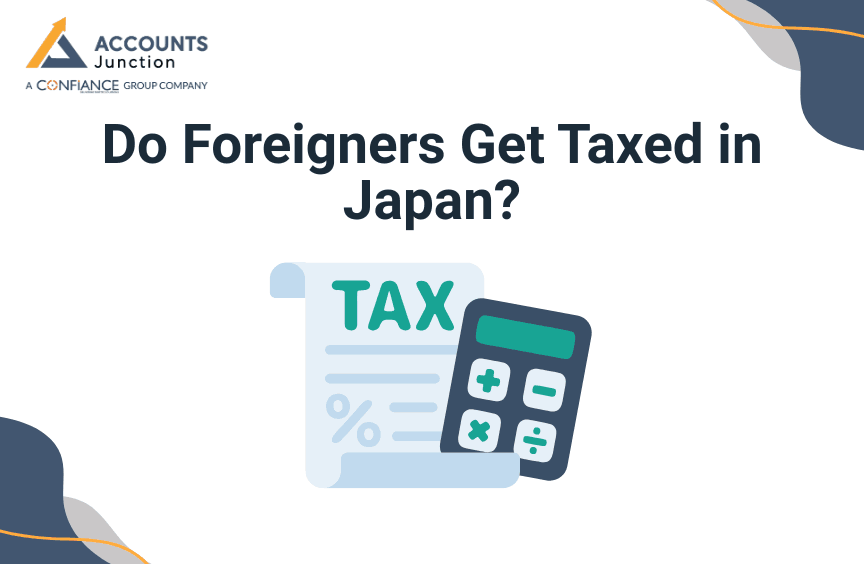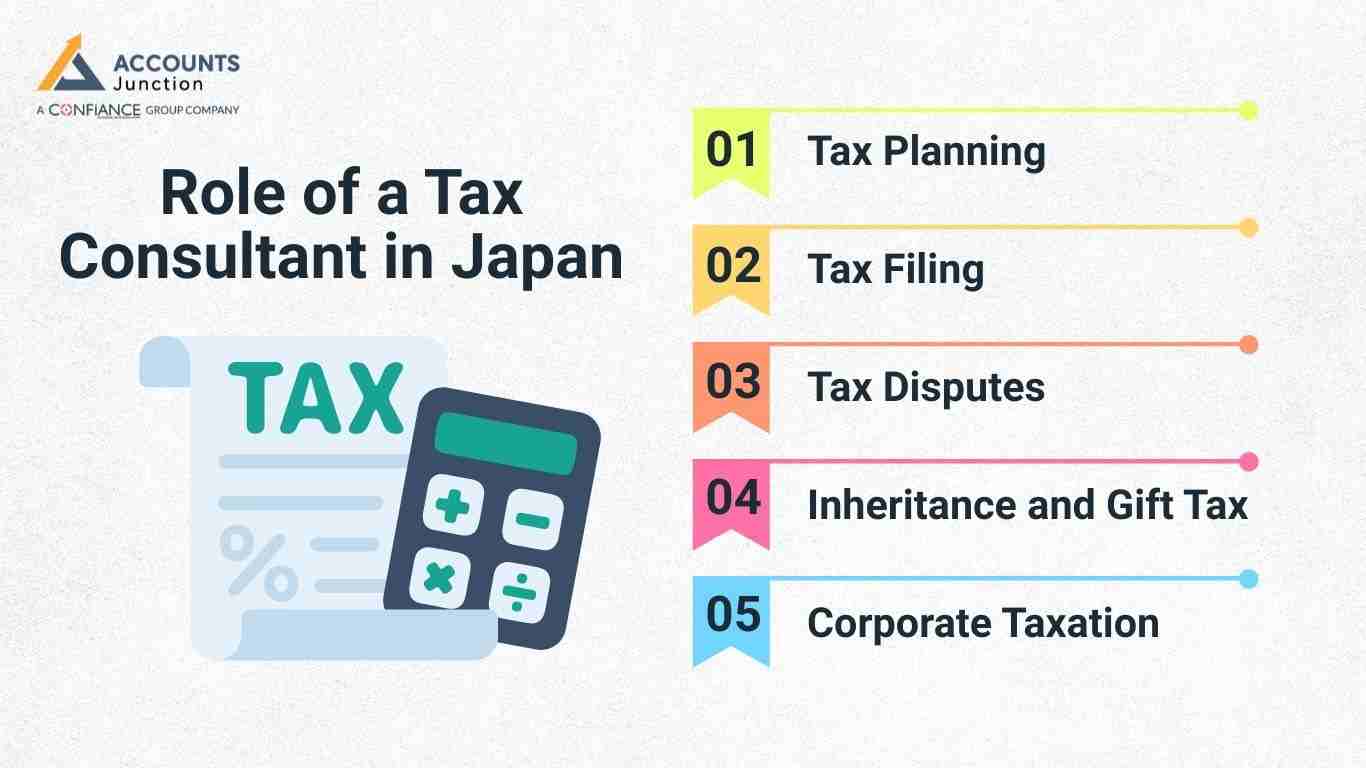
Do Foreigners Get Taxed in Japan?
Japan has a complex taxation system, especially when it comes to foreign residents. Whether you’re planning to work, invest, or retire in Japan, understanding the taxes in Japan is crucial. This guide provides an overview of how taxes in Japan apply to foreigners and the role of a tax consultant in Japan in navigating these regulations.
For many foreigners, taxes in Japan can feel hard and tense. Rules can change based on where you live, your income, or tax treaties. Without the right knowledge, mistakes can cause fines or fees. Learning the basic tax system and working with a tax consultant in Japan can save time and money. Staying informed makes financial planning and tax filing in Japan easier.
Understanding Residency Status
The first step in determining how foreigners are taxed in Japan is understanding the concept of residency. Japan classifies individuals into three categories based on their residency status:
1. Non-residents
- Those who have lived in Japan for less than one year and do not intend to stay long-term. Non-residents are taxed only on their Japanese-sourced income.
2. Non-permanent residents
- Individuals who have lived in Japan for more than one year but less than five years, without a permanent visa. They are taxed on their Japanese-sourced income and any foreign-sourced income that is remitted to Japan.
3. Permanent residents
- Those who have lived in Japan for more than five years or hold a permanent visa. Permanent residents are taxed on their worldwide income, regardless of where it is earned.
Types of Taxes Foreigners Might Face
Income Tax
- Income tax in Japan is progressive, meaning the tax rate increases with the amount of income earned. Foreigners who earn income in Japan must pay income tax, which is calculated based on their residency status:
Non-residents
- Taxed at a flat rate of 20.42% on Japanese-sourced income.
Non-permanent residents
- Non-permanent residents in Japan are taxed on income earned within Japan and foreign income brought into the country, at progressive rates.
Permanent residents
- Taxed at progressive rates on worldwide income.
- The progressive tax rates for residents range from 5% to 45%, depending on the income bracket.
Local Inhabitant Tax
- Local taxes apply based on residence in a city or prefecture. These taxes support local services and are mandatory for residents. Non-residents usually do not pay local inhabitant tax. A tax consultant in Japan can explain exceptions.
Consumption Tax
- Consumption tax in Japan is similar to the value-added tax in other countries. It applies to goods, services, and some imports. Foreigners pay consumption tax when purchasing items in Japan. Businesses often include tax in the price, so it is easy to track.
Special Tax Rules for Foreigners
Tax Treaties
Japan's tax treaties with multiple nations prevent double taxation, reduce tax rates, and eliminate evasion, promoting international trade and investment. These treaties can provide tax relief or exemptions on certain types of income, such as dividends, interest, and royalties. It's essential to consult a tax consultant Japan to understand how these treaties apply to your specific situation.
Reporting Foreign Income
People from other countries who live in Japan must report income from abroad. This includes pay from jobs, rent, or money from stocks in other lands. Not telling the tax office can bring fines, more tax, or legal trouble.
The rules can be hard if you have more than one income or move often. A tax expert in Japan can check that you report all income on time. They can also show ways to cut tax while still following the law.
Social Security Contributions
Foreign workers in Japan must pay into the social security plan. This covers health care, pensions, and help if you lose work. The pay amount depends on your job, pay, and your employer.
These payments are key, as they affect future pensions and health care. A tax expert in Japan can show how much to pay, when to pay, and how to get benefits. Good advice keeps you in line with the rules and gives full value from the plan.
Filing Taxes in Japan
-
Annual Tax Return
People who live in Japan must file their tax return each year from February to March. Non-residents may also file if they earn money in Japan from work, rent, or other sources.
Filing on time and with the right data helps you avoid fines and extra charges. The tax rules can be hard, as there are many types of income and ways to claim deductions.
Tax consultants in Japan can make the process easy. They check your forms and help you file with no mistakes.
-
Required Documents
You need to collect some key papers to file taxes. These include pay slips, income sheets, receipts for expenses, proof of insurance, and ID.
Keeping these papers in order makes filing fast and cuts errors. People with more than one income may find it hard to track all papers.
Tax consultants in Japan can help get, check, and sort all your papers. This makes filing safe and smooth.
-
Penalties for Non-Compliance
If you do not pay or report taxes, you may face fines or extra charges. Non-residents can also face limits on travel.
Even small errors can lead to audits or more checks. Knowing the rules and filing right can keep you safe from these problems.
Tax consultants in Japan can make sure all rules are met and fix any issues fast. This cuts stress and cost for you.
Role of a Tax Consultant in Japan
Navigating the Japanese tax system can be challenging for foreigners due to its complexity and frequent changes in regulations. A tax consultant Japan can provide valuable assistance in the following areas:
1. Tax Planning
A tax consultant can help you plan your finances to minimize tax liabilities by taking advantage of deductions, credits, and exemptions available under Japanese law.
2. Tax Filing
They can assist with preparing and filing tax returns, ensuring compliance with all regulations and deadlines, which is especially important for individuals with complex income sources or significant assets.
3. Tax Disputes
If you encounter any disputes or issues with the Japanese tax authorities, a tax consultant can represent you and negotiate on your behalf.
4. Inheritance and Gift Tax
A tax consultant can guide inheritance and gift tax planning, helping to structure your assets in a tax-efficient manner.
5. Corporate Taxation
For foreign business owners, tax consultants can assist with corporate tax planning, compliance, and filing, ensuring that your business meets all Japanese tax obligations.
Tips for Foreigners Paying Taxes in Japan
- Keep clear records of all income in Japan. Save all slips, bills, and bank papers to make filing easy.
- Track foreign income if you live in Japan. Report all income from abroad to avoid tax trouble.
- Ask a tax consultant in Japan for help with filing. They can show you ways to lower your tax legally.
- Know your residency status for correct tax rules. Rules change if you are a resident or not.
- Pay taxes on time to avoid fines. Late payments bring extra charges and interest.
Common Challenges for Foreigners
- Language Barrier
Tax papers in Japan are often hard to read. Many foreigners cannot understand Japanese tax words clearly. A tax consultant in Japan explains the terms well.
- Understanding Tax Rules
Japan has many taxes, like national, local, and sales. Foreigners may miss rules or deductions without proper help. A tax consultant in Japan makes filing taxes simple.
- Changing Residency Status
Moving in or out of Japan changes tax duties. Wrong reports of residency may cause fines or fees. Tax consultants in Japan guide foreigners through these changes.
Income Sources Subject to Tax
-
Employment Income
Salary from Japan is always taxed. Your boss may take tax from your pay. Check the tax taken to avoid fines. A tax expert in Japan can help.
-
Business or Freelance Income
If you run a shop or work for free, report all money. Costs for work can lower taxes. File reports right to avoid problems. A tax expert can help with forms.
-
Investment Income
Money from banks, stocks, or funds in Japan is taxed. Treaties may cut tax on foreign cash. Always report income from abroad. A tax expert can work out the tax right.
Taxes in Japan can seem hard, but knowing your duties is key. Foreigners must follow rules for income, local, and sales taxes. A tax consultant in Japan makes filing simple and correct. Careful planning avoids errors and lowers tax costs. Work with a tax consultant in Japan for smooth tax filing.
At Accounts Junction, we specialize in helping foreigners navigate the complex tax system in Japan. Our expert tax consultants offer personalized guidance on tax planning, filing, and compliance to ensure you meet all legal requirements. With our services, you can efficiently manage your taxes in Japan, optimize your financial situation, and avoid potential tax pitfalls.
FAQs
1. Do foreigners need to pay taxes in Japan?
- Yes, foreigners pay tax on income earned in Japan. Rules depend on where you live and the source of income.
2. How is tax residency defined for foreigners in Japan?
- Residency is set by living in Japan for more than one year. Your residency decides which taxes and deductions apply.
3. Are non-residents taxed on income from Japan only?
- Yes, non-residents pay tax only on income from Japan. Income from other countries is not taxed in Japan.
4. What types of taxes do foreigners face in Japan?
- Foreigners may pay income, local, and sales taxes. The rate depends on how much income and your residency.
5. Do foreigners pay local inhabitant tax in Japan?
- Only residents who have lived in Japan for more than one year pay this tax. Non-residents do not pay local tax.
6. Is a consumption tax applied to foreigners in Japan?
- Yes, sales tax applies to goods and services bought in Japan. Shops often add the tax to the price shown.

